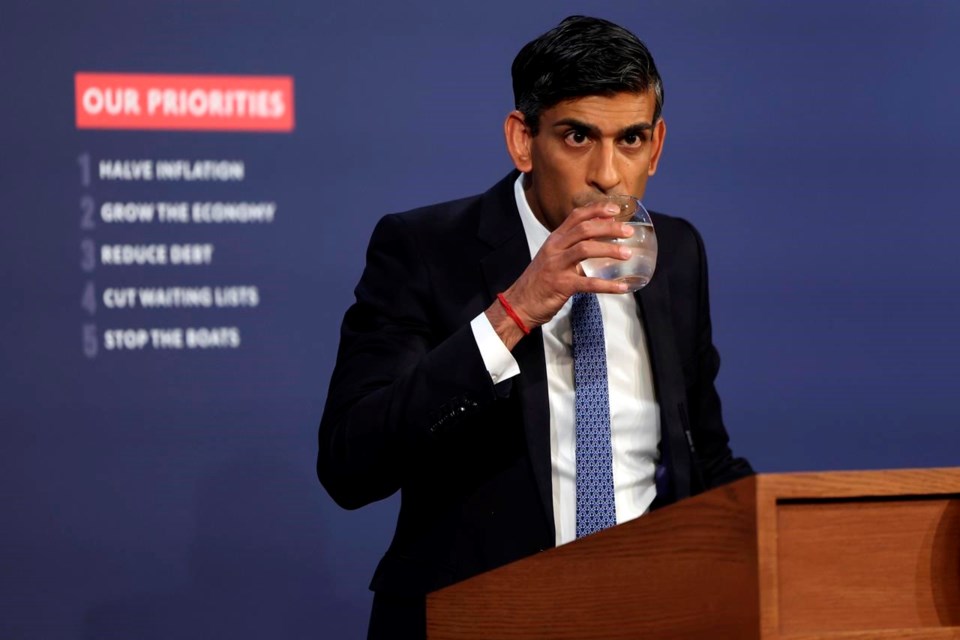LONDON (AP) — The British government offered millions of public sector workers pay raises Thursday in a bid to end an array of strikes that have crippled trains, health care and other services for more than a year amid the biggest cost-of-living crisis in generations.
On the day that tens of thousands of doctors in Britain's state-funded health service launched a five-day walkout, Prime Minister Rishi Sunak accepted pay recommendations from independent review bodies. But he insisted that there would be no more discussions with unions.
Like other nations in Europe, Britain has faced disruptive strikes as workers, from teachers to train drivers and nurses, have pressed for pay that keeps pace with a sharp increase in consumer prices. Also Thursday, major train strike across Italy stranded tourists and commuters.
“Today’s offer is final," Sunak said. "There will be no more talks on pay. We will not negotiate again on this year’s settlements, and no amount of strikes will change our decision.”
He said the accepted recommendations are a “fair deal for the British taxpayer" and offered assurances that they won't lead to more borrowing and stoke further inflation.
Police will see a 7% pay raise, while teachers will get 6.5% and the striking doctors, who are at the early stages of their careers in the publicly funded health care provider, will receive 6%.
Hospital consultants, set to strike in England next week, also will receive a 6% rise. Some professions, including junior doctors, will be getting additional payments.
Already, Sunak said the teaching unions will suspend all planned strikes immediately and will recommend members back the pay offer.
“I want to address those yet to do so,” the prime minister said. “Now that we’ve honored the independent pay recommendations, I implore you: Do the right thing, and know when to say yes.”
Early signs appear to be mixed for the government.
While the FDA union, which represents civil servants, said the offer appears to be “both fair and reasonable,” the British Medical Association, the doctors' union, was far more critical.
“Today’s announcement represents yet another pay cut in real terms and serves only to increase the losses faced by doctors after more than a decade’s worth of sub-inflation pay awards,” said professor Phil Banfield, the medical association's chairman of council.
The timing of Thursday's pay offer shined a spotlight on the 75,000 or so junior doctors on the first day of their walkout, which is being described as the longest-ever strike in the National Health Service. They are asking for a 35% pay bump to get pay back to 2008 levels once inflation is taken into account.
The strike will cause huge disruption for the embattled NHS, which is already dealing with a huge backlog from the pandemic. Plus, about 650,000 operations were canceled during previous strikes by health providers, and tens of thousands of others are expected to be called off over the coming weeks.
The striking doctors say they know the impact on the NHS but insist they have no alternative.
“This isn’t a celebration, this is years of declining pay, declining conditions, frustration, and this is what has culminated as a result,” Alex Gibbs, a striking 31-year-old doctor said outside University College Hospital in north London.
Britain, like other countries, is grappling with high inflation for the first time in years. Price rises were first stoked by supply chain issues resulting from the pandemic and then by Russia’s invasion of Ukraine, which sent energy and food prices soaring.
Though inflation has come down slightly from its double-digit peak — to 8.7% — it is far above the Bank of England 2% target.
Sunak said the 6.5% pay award for teachers will be “fully funded,” with additional money for schools over the coming two years.
The rest, he said, will require departments to “reprioritize” spending, raising fears of cuts. There also will be increased charges for visas and NHS contributions for non-U.K. citizens, which will raise about 1 billion pounds ($1.3 billion).
Praxis, a charity that supports migrants and refugees, said “already eye-wateringly high” visa fees risk seeing people falling deeper into poverty and that the government was treating people born outside the U.K. as “cash cows."
Pan Pylas, The Associated Press



